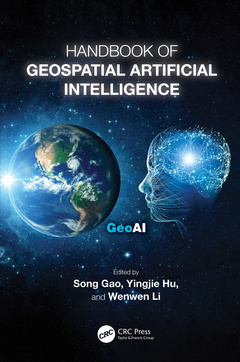Handbook of Geospatial Artificial Intelligence
Coordonnateurs : Gao Song, Hu Yingjie, Li Wenwen

This comprehensive handbook covers Geospatial Artificial Intelligence (GeoAI), which is the integration of geospatial studies and AI machine (deep) learning and knowledge graph technologies. It explains key fundamental concepts, methods, models, and technologies of GeoAI, and discusses the recent advances, research tools, and applications that range from environmental observation and social sensing to natural disaster responses. As the first single volume on this fast-emerging domain, Handbook of Geospatial Artificial Intelligence is an excellent resource for educators, students, researchers, and practitioners utilizing GeoAI in fields such as information science, environment and natural resources, geosciences, and geography.
Features
- Provides systematic introductions and discussions of GeoAI theory, methods, technologies, applications, and future perspectives
- Covers a wide range of GeoAI applications and case studies in practice
- Offers supplementary materials such as data, programming code, tools, and case studies
- Discusses the recent developments of GeoAI methods and tools
- Includes contributions written by top experts in cutting-edge GeoAI topics
This book is intended for upper-level undergraduate and graduate students from different disciplines and those taking GIS courses in geography or computer sciences as well as software engineers, geospatial industry engineers, GIS professionals in non-governmental organizations, and federal/state agencies who use GIS and want to learn more about GeoAI advances and applications.
Section 1: Historical Roots of GeoAI 1. Introduction to Geospatial Artificial Intelligence (GeoAI) 2. GeoAI’s Thousands Years of History 3. Philosophical Foundations of GeoAI Section 2: GeoAI Methods 4. GeoAI Methodological Foundations: Deep Neural Networks and Knowledge Graphs 5. GeoAI for Spatial Image Processing 6. Spatial Representation Learning in GeoAI 7. Intelligent Spatial Prediction and Interpolation Methods 8. Heterogeneity-Aware Deep Learning in Space: Performance and Fairness 9. Explainability in GeoAI 10. Spatial Cross-Validation for GeoAI Section 3: GeoAI Applications 11. GeoAI for the Digitization of Historical Maps 12. Spatiotemporal AI for Transportation 13. GeoAI for Humanitarian Assistance 14. GeoAI for Disaster Response 15. GeoAI for Public Health 16. GeoAI for Agriculture 17. GeoAI for Urban Sensing Section 4: Perspectives for the Future of GeoAI 18. Reproducibility and Replicability in GeoAI 19. Privacy and Ethics in GeoAI 20. A Humanistic Future of GeoAI 21. (Geographic) Knowledge Graphs and Their Applications 22. Forward Thinking on GeoAI
Song Gao is an Assistant Professor and the Director of Geospatial Data Science Lab at the University of Wisconsin-Madison. He holds a Ph.D. degree in Geography from the University of California-Santa Barbara. His research interests are on Spatial Data Science and GeoAI approaches to Human Mobility and Social Sensing. He has authored and co-authored over 50 peer-reviewed articles in prominent journals and conference proceedings. He is the recipient of various research and teaching awards at the university, state, and international levels, including the Waldo Tobler Young Researcher Award in GIScience. He serves as the Associate Editor for Annals of GIS, and editorial board member for Scientific Reports, PLOS One, and Guest Editor for IJGIS, TGIS, and GeoInformatica. He has been a lead organizer for the AAG symposiums on GeoAI and Deep Learning and and for the ACM SIGSPATIAL GeoAI workshops.
Yingjie Hu is an Assistant Professor in the Department of Geography at the University at Buffalo, NY, and at the National Center for Geographic Information and Analysis (NCGIA). He holds a PhD from the Department of Geography at UC Santa Barbara. He is the author of over 50 peer-reviewed articles in top international journals and conferences. He and his work received awards at international, national, and university levels, including Waldo-Tobler Young Researcher Award, GIScience 2018 Best Full Paper Award, and others. His research was also covered by major media such as Reuters and VOA News.
Wenwen Li is a Full Professor in the School of Geographical Sciences and Urban Planning, Arizona State University, where she heads the CyberInfrastructure and Computation Intelligence Lab. Li's work has been applied to several scientific disciplines, including polar science, climatology, public health, hydrology and urban studies. Her research has been supported by various funding agencies, including the National Science Foundation (NSF), United States Geo
Date de parution : 12-2023
15.6x23.4 cm
Disponible chez l'éditeur (délai d'approvisionnement : 14 jours).
Prix indicatif 184,47 €
Ajouter au panier


